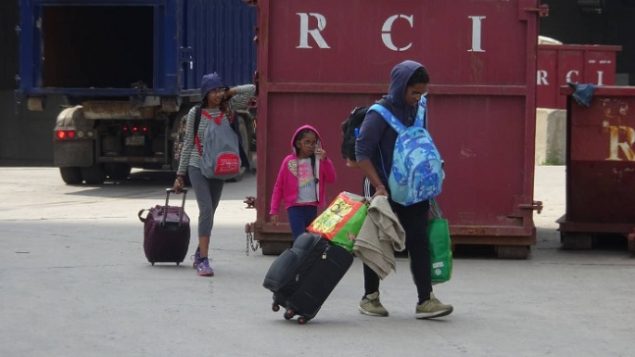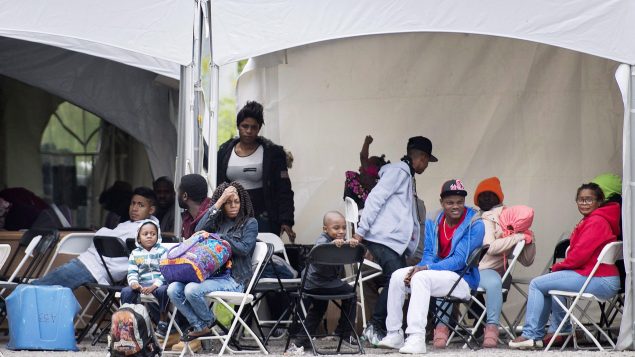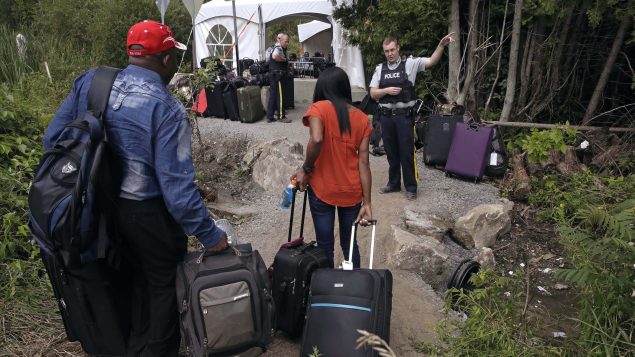The United Nations Refugee Agency, UNHCR, is slamming a proposal by the leader of the largest separatist party in Quebec to build a fence along a section of the Quebec-New York border used by asylum seekers to cross into Canada.
Parti Quebecois Leader Jean-Francois Lisee told reporters before a PQ caucus meeting the fence should go up at Roxham Road in Hemmingford, near the Saint-Bernard-de-Lacolle crossing, about 60 kilometres south of Montreal.
“We have the best known irregular road in the world,” Lisee said. “We have several good fence builders in Quebec, so we’re spoiled for choice.”
The PQ leader said asylum seekers have the right to turn up at the border but should do so at regular crossings in British Columbia, Ontario or New Brunswick so they are treated “humanely” and are more evenly distributed across the country.
When asked who would pay for the fence, Lisee quipped, “the Mexicans.”
“#Canada upholds basic principles of law & humanity at #Roxham #Quebec by allowing people crossing irregularly (and not illegally) to claim #asylum,” Jean-Nicolas Beuze, UNHCR representative in Canada, said in a Twitter reply to Lisee. “@JFLisee’s call to close Roxham is legally & morally wrong + practically impossible (9,000 km).”
#Canada upholds basic principles of law & humanity at #Roxham #Quebec by allowing people crossing irregularly (and not illegally) to claim #asylum.@JFLisee’s call to close Roxham is legally & morally wrong + practically impossible (9,000 km).
We stand #WithRefugees – do you? https://t.co/UbV2MzBXCn
— Jean-Nicolas Beuze (@jnbeuze) April 25, 2018
Later, after several media reported his remarks, Lisee took to Twitter to nuance his comments.
He then held another scrum after the caucus meeting and said Roxham Road should be blocked off “with a sign, a cedar hedge or a police officer” but only after asylum seekers have been told they can go elsewhere.
Reminded he had earlier used the word “fence,” Lisee said he meant “a small fence similar to the type found in schools.”
Canada is coping well

Waves of refugee claimants have arrived in Canada following threats by the U.S. government to oust them. (Charles Contant/CBC)
There is no need for a fence, Beuze said in a phone interview with Radio Canada International. There have been only about 20,000 irregular border crossings into Canada in 2017, he said.
(click to listen to the interview with Jean-Nicolas Beuze)
Listen“We have seen over the last year that the RCMP and the border authorities have been able to absorb this number and process those arriving, including through irregular manner, in a very efficient and effective manner, upholding the principle of law and morality,” he said.
Beuze said the situation is closely tied to the so-called Third Safe Country agreement between Canada and the U.S., which forces asylum seekers to claim asylum in the first country they land in.
A large part of asylum seekers indicated to UNHCR that it was easier for them to obtain a U.S. visa, but that their final destination was always Canada, Beuze said.
“We have to understand when you’re fleeing persecution or bombs falling on your house, you take the first door which is open,” Beuze said. “If it happens to be an American visa, you take the American visa even if your intention is to come to Canada.”
In addition, the Immigration Refugee Board of Canada, an independent quasi-judicial tribunal that hears asylum requests, grants asylum in nearly 60 per cent of all cases, which shows that most of the refugee claims are well-founded, he added.
Quebec says its resources are stretched

Asylum seekers wait to be transported to a processing centre after entering Canada illegally from the United States at Roxham road in Hemmingford, Que., Wednesday, August 9, 2017. (Graham Hughes/THE CANADIAN PRESS)
Quebec Immigration Minister David Heurtel said earlier this month the number of asylum seekers entering the province from the United States had tripled to 6,074 this year from about 2,000 during the same period in 2017.
Heurtel said the number is expected to increase significantly this summer.
According to UNHCR statistics, 50,469 people sought asylum in Canada in 2017.
About 59 per cent of these claims were made by people who entered Canada through regular points of entry, while 41 per cent were refugee claims made by irregular migrants.
“That’s the equivalent of one single day in Bangladesh last September when we had this mass influx of Rohingya refugees who were fleeing Myanmar,” Beuze said.
Uganda received one million South Sudanese refugees over a span of a few months last year, he said.
“Both those countries have not closed their border, they have not been speaking about putting a fence or deploying the army or God know what,” Beuze said. “They have welcomed those refugees because it’s their international obligation, it’s also a moral duty to maintain the border open for those fleeing persecution and conflict.”
Check #FactsFirst before spreading rumors about persons seeking asylum in #Canada
Data shows that there was no mass influx of irregulars last year, #borders remain secure & #asylum system is not broken
Be proud, #Canadians, to stand #WithRefugees
➡ https://t.co/LNk4EkA5MK pic.twitter.com/Wkb8u3Kn2h
— Jean-Nicolas Beuze (@jnbeuze) April 26, 2018
‘Let’s be careful about not crying wolf’
The 2017 figures are the highest number of asylum claims made since 2001 when there were 44,640 asylum claims. The lowest number of asylum claims since 2001 was registered in 2012 with only 10,372 claims. The 2017 numbers represent an 11-per-cent increase compared to 2001 and a whopping 80-per-cent hike if compared to 2012.
The UNHCR also notes that crossing the border outside the official points of entry is not illegal under Canadian law as long as it’s done to seek asylum in Canada.
The majority of irregular crossings into Canada from the United States are done by citizens of Haiti, Turkey, Nigeria, Eritrea and Syria.
However, only 8.3 per cent of Haitian asylum claims are approved, while citizens of Eritrea and Yemen have the highest chance of having their claim accepted at 95.9 per cent and 94.4 per cent respectively.
Canadians need to trust their immigration system, Beuze said.
“It’s a very robust asylum system with very well organized police and border institutions,” Beuze said. “Let’s be careful about not crying wolf, we know that it’s feeding often anti-immigration, anti-foreigner rhetoric and at that time Canada needs to continue to prove that it is very much a welcoming country, which upholds the highest standard in terms of human rights.”
With files from The Canadian Press







For reasons beyond our control, and for an undetermined period of time, our comment section is now closed. However, our social networks remain open to your contributions.